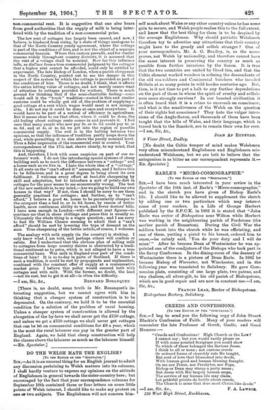[To THE EDITOR OP TEE "sracr.roa.'] Sin,—As it is an
unusual thing for an English journal to admit any discussion pertaining to Welsh matters into its columns, I shall hardly venture to express my opinions on the attitude of Englishmen in general towards the sister-country here ; but encouraged by the fact that your correspondence columns for September 10th contained three or four letters on some little points of Welsh interest, I should like to make my protest on one ot two subjects. The Englishman will not concern him- self much about Wales or any other country unless he has some gain to secure, and Welsh people realise this to the full extent, and know that the best thing for them is to be despised by the average Englishman. Why should patriotic Welshmen therefore try to advertise any attractions that their country might have to the greedy and selfish stranger ? One of your correspondents, Mr. A. G. Bradley, is, as the name proves, not Welsh by nationality, and therefore cannot have the same interest in preserving the country as much as possible from further invasions by the Saxon. It is true that the two countries are united by blood ties, and that the Celtic element worked wonders in refining the descendants of the old sea-robbers and Continental butchers who invaded Britain at so many points in wild hordes centuries ago. But, then, is it not time to put a halt to any further depredations on the part of those in whom the spirit of cruelty and selfish- ness more strongly survives ? In our boasted civilisation it is often heard that it is a crime to encroach on conscience; and what is the sensitiveness of the Welsh on the question of their rights but conscience ? They hate the vulgar intru- sions of the Anglo-Saxon, and thousands of them have been taught that the hills of Wales, and their language, which is traced back to the Sanskrit, are to remain their own for ever. —I am, Sir, &c.,
9 Vicar Street, Dudley.
[No doubt the Celtic temper of mind makes Welshmen very often misunderstand Englishmen and Englishmen mis- understand Welshmen, but we are loth to believe that the antagonism is as bitter as our correspondent represents it.— ED. Spectator.]






































 Previous page
Previous page